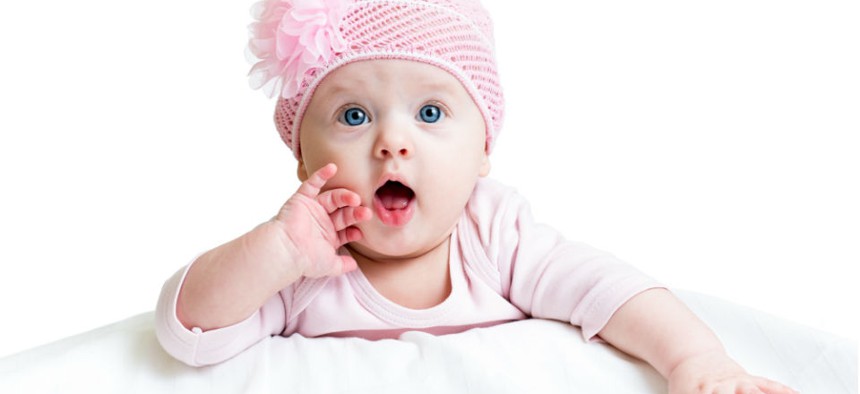
Oksana Kuzmina / Shutterstock.com
Having a Daughter Won't Make You Vote Democratic (or Republican)
A new study challenges previous conclusions about how parenthood changes politics.
It's widely believed that children pick up many of their political beliefs from their parents. But recently, scholars have been analyzing the relationship in the other direction: Does having a daughter make parents more liberal or conservative?
A 2008 study in the U.K. found that having daughters led parents to favor left-wing political parties and hold more liberal views on gender roles. In the United States, however, Dalton Conley and Emily Rauscher of New York University concluded in 2010 that having daughters increased the likelihood of identifying with the Republican Party and embracing more conservative views on teen sexuality. (My colleague Olga Khazan questioned whether that study relied too heavily on the particular political climate of 1994.)
So welcoming a new Sophia or Khaleesi into the family might, in terms of politics, evidently cut both ways. One can see why. For example, Democrats and the liberal British Labour Party have been more aggressive in the pursuit of equal pay for women, while Republicans and the conservative Tories generally hold more restrictive views on women’s reproductive rights and sexuality—which the authors of the U.S. study suggest is an evolutionary rational reaction: “The conservative emphasis on family, traditional values, and gender roles, and pro-life/anti-abortion sentiments all stress investment in children—for both men and women.” Thus conservatism is attractive for “individuals seek[ing] to maximize their chances of passing on genes to future generations.”
But a new working paper by Conley and Columbia doctoral student Byungkyu Lee for the National Bureau of Economic Research reaches a different conclusion. Lee and Dalton reexamined the results from the previous studies using data from the General Social Survey and the European Social Survey. They found “no statistical discernible effect of the first child’s sex on party identification in either the U.S. or the U.K.—where significant effects on party identification were reported—nor on parental political ideology in 36 countries.”
While Dalton and Lee don’t rule out the possibility that having a daughter can lead parents to support women’s issues or to attempt to constrain her sexuality—thus resulting in changes to specific political views—their data show party identification is too heterogeneous, complex, and deep-rooted to be shifted by the sex of one’s child. In other words, the fact that your child’s bedroom is pink isn’t enough to make you more likely to vote red (or blue).
But those specific, single-issue effects have been supported elsewhere, especially regarding those in positions of power. Yale Professor Ebonya L. Washington contends that “each daughter increases a congressperson's propensity to vote liberally, particularly on reproductive rights issues.” Harvard Professors Adam N. Glynn and Maya Sen report that “judges with daughters consistently vote in a more feminist fashion on gender issues than judges who have only sons.” (Glynn and Sen's study showed the effect of daughters were only significant for fathers, indicating that mothers may not be affected because they have already grown up with a feminine point of view.)
There is also anecdotal evidence that the appearance in a family of a person of a certain group can encourage a politician to shift his or her views on a particular gender or sexuality issue. Rob Portman, a Republican senator from Ohio, announced his support for gay marriage in 2013, after his son came out. Former Vice President Dick Cheney, whose daughter Mary is a lesbian, supported gay marriage long before many in his own party.
How do sisters and daughters affect ideas about work? My colleague Sarah Yager examined a few studies last year. Male CEOs with firstborn daughters pay their employees more and themselves less, giving female employees the biggest raises. Men who have daughters grow less attached to traditional gender roles—for example, they become less likely to agree with the statement that “a woman’s place is in the home.” Having a sister seemingly has the opposite effect, making men more conservative politically, more supportive of traditional gender roles, and less likely to do household chores.
Back to the broader question: How does having a woman in the family affect someone’s political beliefs? Well, it depends who you ask and what you ask about.
(Image via Oksana Kuzmina / Shutterstock.com)






